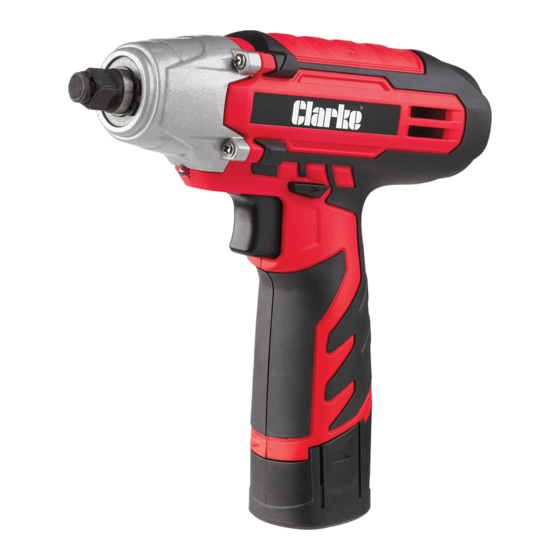Clarke CIWLI300 Instrukcja obsługi i konserwacji - Strona 4
Przeglądaj online lub pobierz pdf Instrukcja obsługi i konserwacji dla Elektronarzędzie Clarke CIWLI300. Clarke CIWLI300 17 stron.

10. NEVER use this wrench for any purpose other than described in this booklet.
11. NEVER carry out any alterations or modifications to this product.
12. NEVER wipe the wrench clean with solvents. Wipe plastic parts with a soft
cloth, slightly dampened with soapy water.
13. NEVER attempt any repairs yourself. If you have a problem with this product
contact your local CLARKE dealer.
14. ALWAYS use an approved cable extension suitable for the power rating of
the battery charger (see specifications), the conductor size should also be
at least the same size or larger than that on the charger. When using a
cable reel, always unwind the cable completely.
IMPACT WRENCH SAFETY INSTRUCTIONS
1. ALWAYS ensure the wrench is not moving with the selector bar in the
centre position when changing sockets etc. Use only impact wrench
sockets....DO NOT use standard sockets.
2. ALWAYS finish tightening nuts with a torque wrench to the correct torque as
recommended by the vehicle manufacturer.
3. ALWAYS avoid excessive use of the wrench. When tightening a nut or bolt,
always avoid over tightening.
4. ALWAYS ensure the wrench has stopped before putting it down after use.
5. ALWAYS only use sockets which are specified for impact wrench use.
6. ALWAYS set the forward/reverse selection bar to neutral when changing
bits or when the wrench is not required for immediate use. This will avoid
accidental starting.
LITHIUM-ION BATTERY USE AND CARE
1. Only use the wrench with the battery pack supplied. Use of any another
battery pack may create a risk of injury and fire.
2. Do not charge the battery when the room temperature is below 10
not store the battery where the temperature may exceed 40
3. When the battery pack is not in use, keep it away from metal objects that
could make a connection from one terminal to another. Shorting the
battery terminals together may cause burns or a fire.
4. Dispose of spent batteries correctly as they contain Lithium-ion. They are re-
cyclable and should be taken to a recycling centre to be disposed of as
stipulated by local regulations. Do not incinerated battery as it may
explode when exposed to fire. Do not attempt to open, disassemble,
modify or service a battery pack.
5. Handle batteries so as to avoid damage, fire, corrosion or personal injury.
Parts & Service: 020 8988 7400 / E-mail: [email protected] or [email protected]
4
o
C. Do
o
o
C (104
F)
